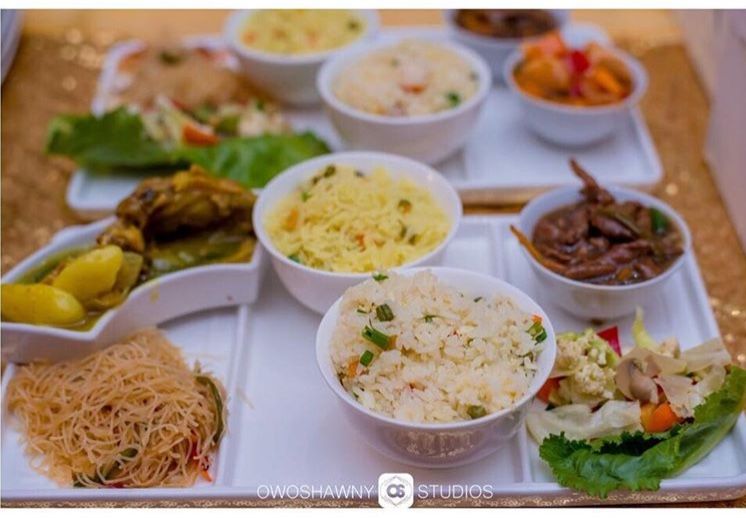BASKETMOUTH AT PHM’s EVENT 😱 WAHALA!!!

It’s another Owambe!!! Another moment to ‘UNWIND’ (Ckay’s voice) and enjoy life and attend a social event. Lest I forget, hope you have gotten your stomachs ready for the enjoyment this weekend. Uhmmmmm. Abi I hear, I branch de ni? Either ways, God no go shame us. Ehn ehn, make i clear throat, this week, I have brought another matter for us to discuss. Drum rolls…….. BASKET MOUTH!!!
NO EMPTY PLATES HERE!!! IT’S A PORTION WEEKEND EVENT AGAIN!!!
Portion control at a party simply impresses the practice of limiting the amount of food and drink consumed served to each individual at a party. It involves controlling the portion sizes of different dishes and beverages to ensure that guests consume amounts and avoid excessive indulgence. As per se, we know people wey dey chop indiscriminately during events.

Though portion control should not compromise the enjoyment of the party, the goal is to provide a balanced and satisfying experience for guests while promoting moderation and mindful eating. Offering controlled portion sizes of food at a party makes you healthy and encourages the prevention of overchopping. This can be helpful when serving high-calorie or rich foods.
Implementing Portion Control at an Event can have Several Benefits, which can Include:
Having a meaningful portion of a meal at a party is very important and respectful rather than consuming more than portions because you are seeing it as a privilege to be invited to an enabling and fantastic party. Really drinking the right potion is the best because of the following implication:
- It Helps to Cater for Dietary Restrictions: Portion control of meals at a party allows hosts to accommodate guests with specific dietary needs or restrictions. Offering a variety of portion-controlled options, such as vegetarian or gluten-free dishes, guests can find suitable choices that align with their preferences.
- It Helps to Reduce food waste: Parties often involve a wide variety of dishes, and portion control helps minimize food waste. By serving smaller portions initially, hosts can gauge the demand and adjust reducing the chances of excess food being thrown away.
- It Helps to Reduce Cost-Effect: Limiting portion sizes at a party can help hosts to manage their budget effectively. By offering smaller portions, hosts can provide a wider variety of dishes without overspending on excessive quantities.
- It Helps to Have Meal Planning: Discussing the benefits of planning meals in advance to ensure a balanced and varied menu.

- It Helps to Plan Cooking Methods: Exploring different cooking techniques ahead of a party is really helpful, various methods such as Grilling, Baking, or Steaming, to prepare healthier versions of your favourite dishes.
- It Helps to Ensure Hydration: Highlighting the importance of staying hydrated and offering creative ideas for refreshing and non-alcoholic beverages.
- It Encourages Socializing without Overeating: Sharing tips on how to engage in conversations and enjoy the party without constantly reaching for food.
- It Helps to Plan for Dessert Alternatives: Discuss alternatives to traditional sugary desserts, such as fruit platters, yoghurt parfaits, or dark chocolate treats.
- It Ensures Balancing Indulgence and Nutrition: Encouraging guests to enjoy special treats while also emphasizing the importance of maintaining a balanced diet.
Implementation of Food Portion Control at Events
Hosts can consider the following strategies in order to control guests’ excessive portion of feeding within a party event.
- Serve Food in Smaller Plates or Bowls: Smaller plates visually appear more satisfying, with reduced portions. Guests may be less likely to overindulge when their plates are not excessively large.
- Offer Bite-Sized or Mini Versions of Dishes: Serving smaller, bite-sized portions of popular dishes allows guests to sample a variety of flavours without consuming large quantities.
- Provide Individual Servings: Preparing individual servings or using portion-controlled packaging can help guests monitor their intake. This can be particularly useful for desserts, snacks, or drinks.

- Offer a Variety of Options: Instead of serving large portions of a few dishes, provide a wider selection of smaller portions. This encourages guests to try different options without feeling obligated to finish a large portion of any one dish.
- Label portion sizes: Clearly indicating portion sizes on food labels or display cards can help guests make informed choices about how much they consume.
However, in several cases, we have seen party hosts being upset because of a lot of meals that are wasted, just because they want to ensure portions of meals are served and nothing is left for disposal.
As a Host what to do to Ensure Your Excess Meal Portions after an Event do not Lead to Waste:
There are several things to do in order to ensure that a larger proportion of the meal planned and made wasn’t a waste and the following is expected to help you prevent wastage in food after your party.
Offer Leftovers to Your Resort Manager: If there are resort managers in your event who help you manage your guest and they have tasted the food and they would like to take some leftovers home, offer them the opportunity to do so. Provide containers or ask them to bring their own for packing the extra food.
Donate to a Local Shelter or Food Bank: Contact local shelters or food banks in your area to see if they accept donations of prepared food. Many organizations appreciate receiving surplus food to help feed those in need. Ensure that the food meets any requirements they may have regarding packaging or storage.
Repurpose Leftovers for Future Meals: Get creative with the leftover food and repurpose it into new meals. For example, you can turn leftover roasted chicken into sandwiches or salads, use vegetables in a stir-fry or omelette, or make a soup or casserole with various ingredients.
Share with Neighbors or Friends: If you have neighbours or friends who might appreciate some extra food, consider sharing the leftovers with them. You can package the food in individual portions and distribute it among those who are interested.
Freeze for Later Use: If the leftovers are suitable for freezing, portion them into meal-sized containers and freeze them for future use. Label the containers with the contents and date to keep track of what you have stored.
Compost: If the leftovers are not suitable for consumption or donation, composting is an environmentally friendly option. Separate any food waste from non-food items, such as packaging or bones, and add the organic waste to your compost pile or bin.
Remember to prioritize food safety and hygiene when handling leftovers. Store them properly in airtight containers in the refrigerator or freezer to maintain freshness and prevent spoilage because of a lot of things that might happen to it and yourself as a guest and a host, after the party in which you shall see them at the next series of owambe edition next week.
PICTURE CREDITS:
Cover Picture: Meredith Sweet Pea – https://meredithsweetpea.wordpress.com/2014/07/10/no-elbows-on-the-table-please-meredith-sweetpea-manners-etiqhttps://meredithsweetpea.wordpress.com/2014/07/10/no-elbows-on-the-table-please-meredith-sweetpea-manners-etiquette/uette/
Other Pictures: Prophet Suddenly by the Winlow featuring Apostle Arome Osayi




